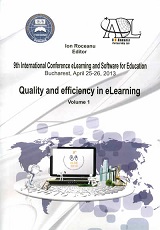SIMULATION AND SOLVING DIDACTIC ACTIVITIES THROUGH E-LEARNING
SIMULATION AND SOLVING DIDACTIC ACTIVITIES THROUGH E-LEARNING
Author(s): Marius Costel ESISubject(s): Education
Published by: Carol I National Defence University Publishing House
Keywords: learning situations; didactic activities; E-learning paradigm; didactic efficiency; new technology of learning
Summary/Abstract: The dynamics of social reality reveals methodological explanations regarding the role, the functions and the use of educational culture. The existence of an assuming process of some well-defined managerial strategies implies highlighting the manner in which a cultural dimension becomes pragmatic at the social level. In these conditions, contexts, conditionings and requirements in defining and explaining the educational culture are significant. Methodological issues brought into question reveal an explanatory approach that legitimizes assumptions regarding the acceptance of E-learning within the educational culture. The issue of assuming a learning situation is becoming one of major importance given that it is performed at the level of educational activities. Therefore, educational actors involved in this process are in contact with didactic methods designed to facilitate the learning process. It is about students and teachers using in practice the new learning technologies through a new teaching methodology, methodology that has in the center of its own area of concern the e-learning paradigm. However, not every time educational media prove their usefulness in the work carried out. For this purpose, we focus this analysis on the relationship between simulation and solving educational activities in relation to the new learning technologies (especially the teaching resources as e-learning). Moreover, we take into account, within this approach, the ways of dealing and explicitation of certain problematic didactic situations / contexts encountered during the educational activities compared to behavior of the actors involved these activities. Therefore, we believe that efficiency and quality of elearning in contemporary education depends mainly on the ways of assuming didactic strategies related to new technologies of learning.
Journal: Conference proceedings of »eLearning and Software for Education« (eLSE)
- Issue Year: 9/2013
- Issue No: 01
- Page Range: 309-314
- Page Count: 6
- Language: English

